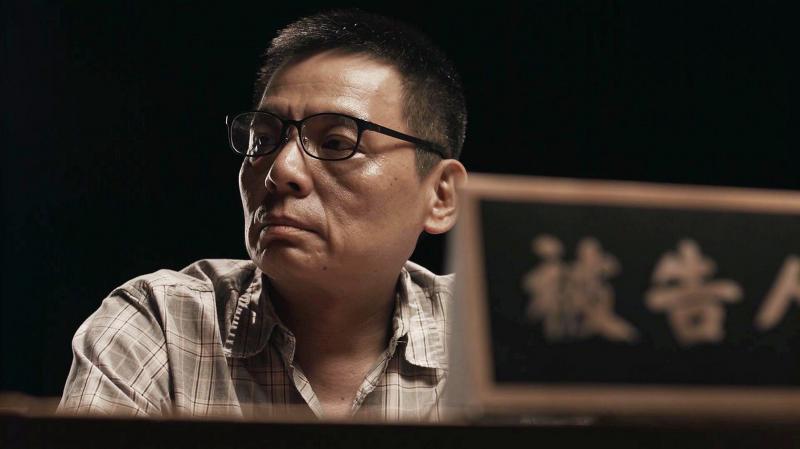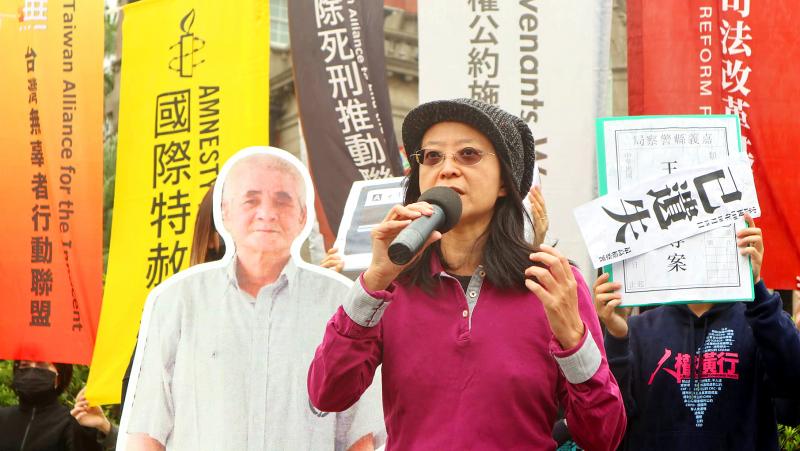This bare-bones, play-like production is exactly what its title advertises: a reenactment of the trial of Wang Xin-fu (王信福), 70, currently Taiwan’s oldest inmate on death row.
Co-director Chang Chuan-fen (張娟芬) focuses mostly on the judicial details of the case and avoids overly relying on emotional appeal — but even from the casting choices and body language of the actors, it’s clear whose side the film is on.
Chang is the chairwoman of the Taiwan Alliance to End the Death Penalty (TAEDP), and is best-known for spearheading the 2017 exoneration of death row inmate Cheng Hsing-tse (鄭性澤), who was wrongfully convicted of killing a policeman and imprisoned for 14 years.

Photo courtesy of TAEDP
Just last month, she released her new book Hoodlum Wang Xin-fu (流氓王信福) to draw attention to this lesser-known case.
Chang finished Judging Wang Xin-fu (審判王信福) in 2020, and TAEDP continues to screen it around Taiwan with discussion sessions afterward. It now has English subtitles, and the next showing will be on April 23 at 3pm at the Miaobei Art Center in Miaoli. Cheng will be one of the speakers.
As Chang’s book’s name suggests, Wang is a former gangster with a criminal record. In 1990, he was celebrating his girlfriend’s pregnancy at Captain Karaoke in Chiayi County, where he was accused of ordering an underling to shoot and kill two policemen.

Photo courtesy of TAEDP
Despite maintaining his innocence, Wang fled to China because he didn’t believe that a “bad guy” like him would have received a fair trial.
“At least judges today are aware of the presumption of innocence,” his character says in the film, noting how hard it is for people like him to turn over a new leaf due to societal judgment.
While he was in China, his girlfriend remarried, and the child whose life he was celebrating that night still doesn’t know that Wang is his father.
The movie opens with Wang returning to Taiwan in 2006 to treat a medical condition. He’s immediately arrested. Chen Rong-jye (陳榮傑), the person who pulled the trigger, was executed in 1992, while his alleged boss Li Ching-lin (李慶臨) was never caught. The court could only rely on witnesses and contradictory old statements, which the defense claims were made under police torture and duress to frame Wang.
Most of the film takes place in a minimalist courtroom setting, where only the furniture and actors are shown against a black backdrop. It works aesthetically and stylistically, and the stage setup reminds the viewer that this is a recreation of a past scene.
As mentioned earlier, the casting choices and mannerisms of the characters are deliberate, bringing an extra layer of intrigue to the film. Hsu Tzu-chiang (徐自強), a former death row inmate who was freed in 2016, portrays a calm and articulate Wang, who maintains the dignified yet repentant air of a reformed gang leader despite his predicament.
Huang Chih-hao (黃致豪), a TAEDP-affiliated human rights lawyer who sometimes gets flak for defending “bad guys,” plays the defense attorney. Huang really milks the image of the likable, stand-up guy who’s willing to give his all for what he thinks is right, while the prosecutor (Ma Shih-fang, 馬世芳) seems aloof and constantly annoyed, as if he just wants this ordeal to be over.
Cheng and Chaung Lin-hsun (莊林勳), also a pardoned death-row inmate from the infamous Su Chien-ho (蘇建和) case, both have non-speaking roles as judges.
The scene reenacting Chen’s confession of how Wang compelled him to pull the trigger is slightly overwrought — Chen is depicted as a madman who is tearing up papers and laughing fanatically.
Judging Wang Xin-fu (審判王信福) might not be the most exciting thing to watch, but for those interested in human rights, the hour-long back and forth is a compelling exchange that shows the intricacies and challenges behind these questionable cases — especially over something that happened more than a decade ago.
With the script methodically structured to make the arguments and talking points as clear as possible, it’s really easy to understand the crux of the problem and why TAEDP believes that Wang is innocent.
Finally, the loudest proponents of death penalty are often the families of the victims, but in this case more than 30 years have passed. Still, it would have been nice to give a name or a face to the two young cops who died tragically that night — whether it was Wang’s fault or not.

Under pressure, President William Lai (賴清德) has enacted his first cabinet reshuffle. Whether it will be enough to staunch the bleeding remains to be seen. Cabinet members in the Executive Yuan almost always end up as sacrificial lambs, especially those appointed early in a president’s term. When presidents are under pressure, the cabinet is reshuffled. This is not unique to any party or president; this is the custom. This is the case in many democracies, especially parliamentary ones. In Taiwan, constitutionally the president presides over the heads of the five branches of government, each of which is confusingly translated as “president”

Sept. 1 to Sept. 7 In 1899, Kozaburo Hirai became the first documented Japanese to wed a Taiwanese under colonial rule. The soldier was partly motivated by the government’s policy of assimilating the Taiwanese population through intermarriage. While his friends and family disapproved and even mocked him, the marriage endured. By 1930, when his story appeared in Tales of Virtuous Deeds in Taiwan, Hirai had settled in his wife’s rural Changhua hometown, farming the land and integrating into local society. Similarly, Aiko Fujii, who married into the prominent Wufeng Lin Family (霧峰林家) in 1927, quickly learned Hoklo (commonly known as Taiwanese) and

The Venice Film Festival kicked off with the world premiere of Paolo Sorrentino’s La Grazia Wednesday night on the Lido. The opening ceremony of the festival also saw Francis Ford Coppola presenting filmmaker Werner Herzog with a lifetime achievement prize. The 82nd edition of the glamorous international film festival is playing host to many Hollywood stars, including George Clooney, Julia Roberts and Dwayne Johnson, and famed auteurs, from Guillermo del Toro to Kathryn Bigelow, who all have films debuting over the next 10 days. The conflict in Gaza has also already been an everpresent topic both outside the festival’s walls, where

The low voter turnout for the referendum on Aug. 23 shows that many Taiwanese are apathetic about nuclear energy, but there are long-term energy stakes involved that the public needs to grasp Taiwan faces an energy trilemma: soaring AI-driven demand, pressure to cut carbon and reliance on fragile fuel imports. But the nuclear referendum on Aug. 23 showed how little this registered with voters, many of whom neither see the long game nor grasp the stakes. Volunteer referendum worker Vivian Chen (陳薇安) put it bluntly: “I’ve seen many people asking what they’re voting for when they arrive to vote. They cast their vote without even doing any research.” Imagine Taiwanese voters invited to a poker table. The bet looked simple — yes or no — yet most never showed. More than two-thirds of those